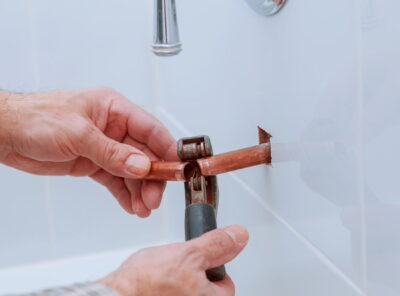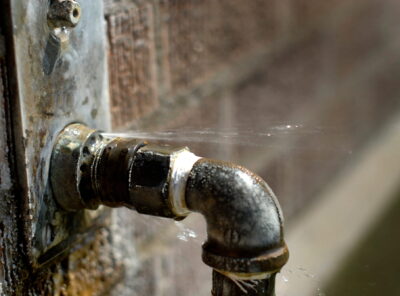Ep.3 Hot Water Tanks: Replacement, Leaks, Maintenance
Show Notes
[00:00:00] Sherman Hu: Welcome to another podcast by Kingdom Plumbing and Heating. We have Clay Bristow here with me. Clay, how’s your afternoon?
[00:00:07] Clay Bristow: All right, it’s going good. Thanks for having me again.
How long does a hot water tank last?
[00:00:10] Sherman Hu: That’s awesome, man. I wanted to ask you this really hot topic of a question. And it has to do with hot water tanks. So how long does a hot water tank last?
[00:00:23] Clay Bristow: I get that question a lot. It does vary and depend. I mean your hot water tank really can last anywhere between, I’ve seen hot water tanks go at six years, I’ve seen hot water tanks go at 40. The oldest tank I ever pull out of a house it was about 42 years old.
[00:00:38] Sherman Hu: Did you just say 42?
[00:00:40] Clay Bristow: Yep. 42 years old. Yeah.
[00:00:41] Sherman Hu: Wow. Okay.
[00:00:43] Clay Bristow: The oldest one I’ve ever pulled out and they definitely don’t make them like that anymore. The tanks that they make nowadays, I don’t think you could ever get 42 years out of it. But what’s more interesting is in our geographical location and our demographic here, it’s not so much about how long a hot water tank will last; it’s how long will your insurance company let your hot water tank last.
What’s more interesting is in our geographical location and our demographic here, it’s not so much about how long a hot water tank will last; it’s how long will your insurance company let your hot water tank last.
Clay Bristow, Kingdom Plumbing and Heating
[00:01:03] Sherman Hu: Oh, ok.
[00:01:05] Clay Bristow: So more often than not. It’s actually your insurance company. At least this is the feedback I’ve received from my clients is that some of their insurance companies have come back to them and said that they will not insure them for flood damage at all, if they don’t replace their hot water tank, once it has exceeded, I think it’s around the 10 to 12 year range. So most of the time nowadays, we just recommend around the 10 to 12 year mark, to think about replacing your hot water tank. But a tank can last longer than that.
Feedback I’ve received from my clients is that some of their insurance companies have said that they will not insure them for flood damage at all, if they don’t replace their hot water tank, once it has exceeded around the 10 to 12 year range. Nowadays, we just recommend around the 10 to 12 year mark, to think about replacing your hot water tank. But a tank can last longer than that.
Clay Bristow, Kingdom Plumbing and Heating
Do customers come to you for hot water tank replacement around the 10 to 12 year mark?
[00:01:36] Sherman Hu: Do most of your clients or customers come to you for replacement around that time? Around the 10 to 12 year mark?
[00:01:42] Clay Bristow: I get a mix of both. So I get a mix of clients calling me, I’d say it’s 50-50 of clients that call me and say, “Hey, our tank is 10 years old. There’s nothing wrong with it, we want to preventively get it changed out.”
[00:01:54] So obviously we do that. And then you get the people that call you, at 10:30 at night and say, “Hey, [00:02:00] our hot water tank is let go, we need to deal with this right away.”
[00:02:02] Obviously much easier to do it preventatively and…
[00:02:05] Sherman Hu: …versus a forced to replacement.
[00:02:08] Clay Bristow: Yeah, exactly. Cause sometimes, we can’t necessarily get a tank right away. There’s certain applications that are really tight, let’s say your hot water tank is in a closet with your furnace and it’s really tight. That might call for a specialty size that we can’t necessarily just go down to the store and buy; that we might need to order.
[00:02:27] So it’s if you can do it preventatively, if it works in your budget, of course. It is normally the best way to go.
When a hot water tank leaks, does it start with a leak around the tank first and then gets into a bigger flow later?
[00:02:34] Sherman Hu: You were speaking just a moment ago, the tanks busting and calling an emergency call. You need some help. Does it start with a leak around the tank and then it gets into a bigger flow later?
[00:02:47] Clay Bristow: Yeah. Yeah. Tank leaks come in all shapes and sizes. Normally, yeah, it’ll start out as, maybe it just cracks the inner tank. Cause there’s an outer tank and there’s an inner tank. So when you go over to your hot water tank, and you [00:03:00] touch it, you’re not touching the inner tank, you’re touching the outer tank, right?
[00:03:04] If you were to cut open that little bit of metal, what you’d see is some insulation. And then if you push back the insulation, you’d see the inner tank is actually what’s holding the water. That’s where the water is. And so what happens is, that’s welded metal. And it might rust, or it might the water might find a way to get out of the inner tank somewhere and then it’ll start leaking. But you might not notice it right away. If your tank is on a pan, we call the pan drain. So it’s basically just a piece of metal, that it’s underneath.
[00:03:32] Sherman Hu: Is that usually the circular pan that’s at the bottom?
[00:03:34] Clay Bristow: Yeah, exactly. And so that’s normally hooked up to a drain or at least it should be.
[00:03:39] And if it’s leaking and you have a pan, it might just be going into that drain. You might not even notice it. You might not even notice that you have a leak.
[00:03:45] A lot of my clients who noticed they have a leak it’s cause all of a sudden they don’t have any hot water and that’s because the leaks gotten pretty bad by that point.
[00:03:53] That means the water is passing through the tank so fast that it doesn’t have any time to heat up. [00:04:00] Cause for the water to heat up, it has to stay in the tank for a little bit of time.
[00:04:04] That’s why if you took an hour long shower or two hour long shower and you drained your whole tank, all of a sudden you’d have no hot water, you’d run out, you’d have cold water and you’d have to wait another hour or so before your hot water tank recovered, what we say recovers.
[00:04:18] Sherman Hu: And it was just cruel and unusual punishment.
[00:04:21] Clay Bristow: No. Yes, you don’t. You don’t want to deal with that unless it’s hot outside.
Do you get questions from customers about maintenance of hot water tanks?
[00:04:24] Sherman Hu: Do you get questions from customers about maintenance of hot water tanks?
[00:04:28] Clay Bristow: Yeah. So maintenance, there’s really only, and whether you have an electric or gas tank, there’s really only one thing I’d say that homeowners can do to their tank. And that is to drain it occasionally, maybe annually.
[00:04:41] This is something we can recommend. But if you don’t do it, it’s not a big deal.
Whether you have an electric or gas tank, there’s really only one thing I’d say that homeowners can do to their tank. And that is to drain it occasionally, maybe annually. This is something we can recommend.
Clay Bristow, Kingdom Plumbing and Heating
[00:04:46] The sediment will build, you do that to relieve the sediment build up at the bottom, which in theory will help the tank for sure, and definitely increase efficiency.
[00:04:54] And so you just want to make sure that you have it done by a professional, or if you want to try to do it yourself[00:05:00] make sure that you’re learning the correct steps on how to do that, to safely shut off your tank, whether it be electric or gas so that when you’re draining it, you’re not causing any distress to the tank.
[00:05:12] Sherman Hu: Okay. I do know that next week’s episode, we’ll cover more about hot water tank types, the variety of hot water tanks. Today, we’re going to cover just general, some maintenance.
Don’t be afraid of the hot water tank.
In wrapping up today’s episode, Clay, any final words to our viewers about hot water tank general topics?
[00:05:31] Clay Bristow: I’d say, don’t be afraid of the hot water tank.
[00:05:33] I get some clients who, it starts to leak, they get really stressed out about it.
[00:05:37] Know that the tank, as long as it’s been installed correctly, if it’s on a pan, even if it begins to leak or anything like that, it’s old, you’re worried about it, definitely find the shut off, which should be just above the tank.
[00:05:50] Trace the cold water line back until you find a shut off. And if you are having concerns about it, of course, you can always shut that water off there and call us. Call a professional. [00:06:00] We’ll come down and help you out.
I get some clients when their water tank starts to leak, they get really stressed out about it. Find the shut off, which should be just above the tank. Trace the cold water line back until you find a shut off. And if you are having concerns about it, of course, you can always shut that water off there and call us. Call a professional. We’ll come down and help you out.
Clay Bristow, Kingdom Plumbing and Heating
[00:06:02] That’s great Clay. Thank you viewers for watching our podcast today and stay tuned for next week’s episode as we talk about hot water tank types or types of hot water tanks. Until next week, this is Clay and I, signing off of today’s Kingdom Plumbing and Heating podcast.







